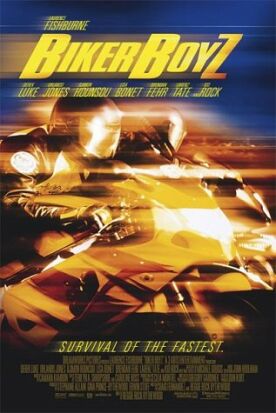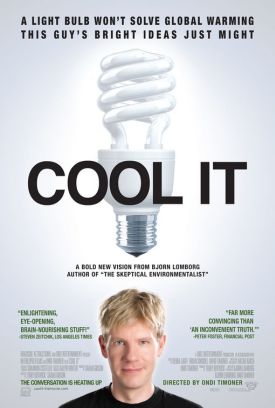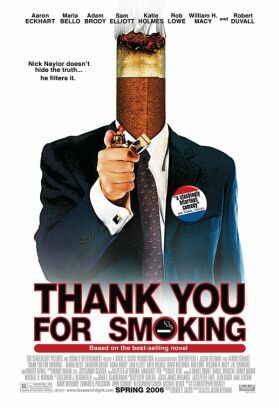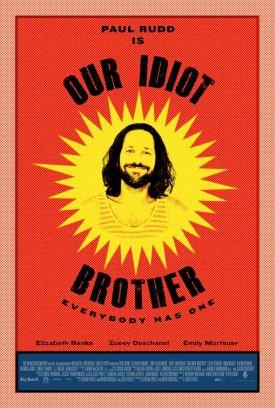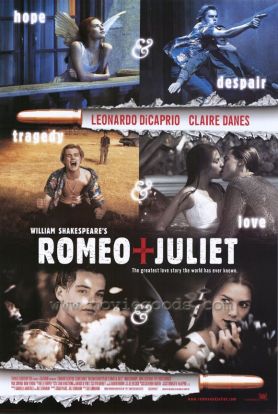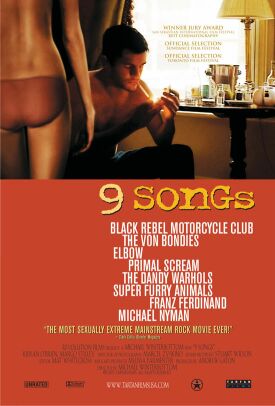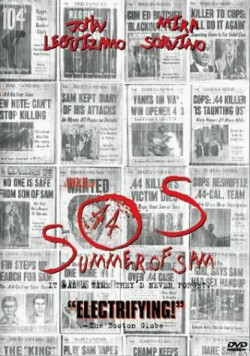Biker Boyz
Like the Iliad, Biker Boyz — directed by Reggie Rock Bythewood from a screenplay he co-wrote with Craig Fernandez and based on an article by Michael Gougis in New Times magazine — presents us with the theatre of raw masculinity. Also like the Iliad it depicts a series of stylized taunts and scenes of individual combat between characters who are ever-conscious of their theatricality. The highly structured and hierarchical world of the California biker gangs is even called “the set,” and its Agamemnon, “the King of Cali” and leader of the Black Knights, also known as “Smoke” (Laurence Fishburne), speaks of violations of its rules as likely to result in one’s being “thrown off the set.”
Homer would have understood that language. Troy was in a way the world’s first movie set, and all the actors were as busy watching as they were fighting. Unfortunately, the similarity between Biker Boyz and the Homeric epic pretty much ends there. Its more salient resemblance is to a video-game, or a music video, since its strutting masculinity and biker duels on two wheels seem to take place in a dream world, the world of gesture and response, of trash-talking and attempts to make it good.
It is said, for instance, that Smoke “doesn’t see anything, doesn’t hear anything,” when he is racing. “A cat like that gets in the zone, it’s a gift from God.” This state is graphically represented for us in the form of a diaphanous tunnel in which all the world save the road ahead is reduced to blurred and swirling colored lights. But the film takes place in a tunnel of its own where no one has to worry about making money or paying bills or getting the kids off to school. Though ostensibly realistic, it can’t be bothered with reality.
There are signs that originally, the real world was meant to intrude, so that a contrast was to be drawn between the knights in their colorful leather costumes emblazoned with various totems and talismans and their workaday selves. On the only occasion where the police take notice of what would seem to be pretty major disruptions to city streets, the young Achilles and challenger to Smoke’s supremacy called, I kid you not, Kid (Derek Luke) is arrested before being sprung by another of the Black Knights, Soul Train (Orlando Jones), in his alter ego as a lawyer.
But in the end the allure of presenting us with the simulacrum of an aristocratic, warrior society, entirely devoted to love and its quaint tests of manhood, proved too strong for any lingering impulse to realism. The love interest, a tattooist called Tina (Meagan Good) has a brief moment for strutting of her own — though only as what used to be called, before lipstick-feminism, a “sex object” — but once she is claimed by Kid, she fades demurely into the background.
This only adds to the overwhelming sense, so common in films that celebrate gang culture, of male wish-fulfilment. The other common element in such pictures, an incongruous moralism, is also present here, though in an unusually gnomic form. For example, several times repeated is what Kid’s dead daddy used to say to him: “Burn rubber, not your soul.” What does this mean? If you had to guess, you might say something like: go fast and show off on your motorcycle but, in spite of such excitements, try to stay relaxed. It doesn’t have the same ring, but it is more comprehensible than Kid’s explanation of the motto to Tina after she has tattooed it on his breast: “Whoever steps to you, remember who you are.”
Even knowing that “steps to” is one of several equivalents of “challenges” or “throws down the gauntlet to” doesn’t help much with that. Both Kid and Smoke, it’s true, finds out that they’re not who they thought they were, or not exactly, but that only underlines the futility of trying to remember what you don’t know. Perhaps you have to be a rapper, or a gang member, to understand it. Like the original motto about burning rubber, not soul, it is to be understood as poetry — which no one now expects, as people used to do in Homer’s day, to mean anything.
Discover more from James Bowman
Subscribe to get the latest posts to your email.

